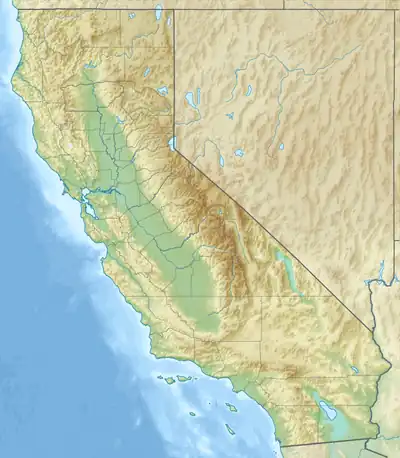Lake Van Arsdale
Lake Van Arsdale, also known as Van Arsdale Reservoir,[1] is a reservoir on the Eel River in California, part of the Potter Valley Project. Located in Mendocino County, 4 miles (6.4 km) north of the town of Potter Valley, California, the reservoir supplies water to users as far south as Marin County.
| Lake Van Arsdale | |
|---|---|
_FROM_SNORE_OPPOSITE_FISH_LADDER_-_Van_Arsdale_Dam%252C_South_Fork_of_Eel_River%252C_Ukiah%252C_HAER_CAL%252C23-UKI.V%252C1-1.tif.jpg.webp) | |
 Lake Van Arsdale  Lake Van Arsdale | |
| Location | Mendocino County, California[1] |
| Coordinates | 39°23′9″N 123°7′2″W[1] |
| Type | Reservoir |
| Primary inflows | Eel River, Mill Creek, Rocky Creek, Trout Creek |
| Primary outflows | Eel River, Powerhouse Canal |
| Catchment area | 345 sq mi (890 km2)[2] |
| Basin countries | United States |
| Max. width | 400 ft (120 m) |
| Surface area | 163 acres (66 ha)[2] |
| Water volume | 700 acre-feet (860,000 m3)[2] |
| Surface elevation | 1,493 feet (455 m) |
The reservoir is formed by the Cape Horn Dam, also known as Van Arsdale Dam,[1] which impounds the waters of the Eel River. A portion of its water (154,000 acre-feet (190,000,000 m3) per year, on average) is diverted southward through an aqueduct tunnel to a powerhouse in Potter Valley, where it drives a turbine capable of generating up to 9.4 MW of electric power. Diverted water then descends by means of the Powerhouse Canal and East Fork Russian River to Lake Mendocino, which supplies the Sonoma County Water Agency. The non-diverted flow continues down the Eel to its mouth at the Pacific Ocean near Fortuna.[3]
History
In 1905, the Snow Mountain Water and Power Company started building the Potter Valley Project. Cape Horn Dam was completed in 1907,[2] and the original project became operational in 1908. Pacific Gas and Electric Company took over the project in 1930 and has owned the dam ever since.
Cape Horn Dam
Cape Horn Dam is a earth fill and concrete gravity dam 63 feet (19 m) high, 515 feet (157 m) long, and 10 feet (3.0 m) thick, containing 40,000 cubic yards (31,000 m3) of material. Its crest is 1,519 feet (463 m) above sea level.[4][2]
References
- "Van Arsdale Reservoir". Geographic Names Information System. United States Geological Survey, United States Department of the Interior.
- "Dams Within the Jurisdiction of the State of California" (PDF). Retrieved September 15, 2010.
- "Potter Valley Project (FERC No. 77) Project Overview". Retrieved September 15, 2010.
- https://www.pge.com/pge_global/common/pdfs/safety/electrical-safety/safety-initiatives/potter-valley/PAD-Sections-1-7.pdf
External links
- SCWA reservoir levels, including Lake Van Arsdale
- Historic American Engineering Record (HAER) No. CA-53, "Van Arsdale Dam, South Fork of Eel River, Ukiah, Mendocino County, CA", 12 photos, 5 data pages, 1 photo caption page